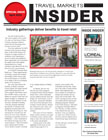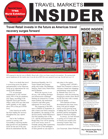 Latin America’s travel retail industry was greeted with mixed news at year’s end as industry executives attempted to decipher the latest decrees from the Mercosur trading bloc, published just before the Southern Hemisphere summer recess on Dec. 16.
Latin America’s travel retail industry was greeted with mixed news at year’s end as industry executives attempted to decipher the latest decrees from the Mercosur trading bloc, published just before the Southern Hemisphere summer recess on Dec. 16.
The decree, which harmonizes the regulations on duty free shops on the borders of all the Mercosur countries, also imposes limitations on a variety of products, including tobacco.
In addition, the decree was “established by the governments without prior consultation to the agents of the sector as well as the representative associations including ASUTIL,” noted ASUTIL Secretary General Jose Luis Donagaray in his comment to the industry.
Speaking with TMI, Donagaray said: “We are pleased to see in principle the publication of the new resolution (Mercosur/GMC/Res. No. 64/18) on 16th December, which is a very important first step in recognizing land border shops throughout all Mercosur countries. This new resolution is designed to harmonize land border duty free regulations throughout the region and for the first time allows each member state to authorize the opening of duty free stores on land borders.
“In theory all countries will now operate using the same rules and we will have a level playing field for all,” he said.
However, Donagaray said that the resolution incudes a list of products that will be excluded from sale in border shops and that the list was drawn up without consultation with interested parties, two disappointing factors.
ASUTIL will coordinate a Board Meeting during the next days to further evaluate the resolution and formulate a response to the official entities, he says: “I have already been talking to Gustavo Fagundes and Enrique Urioste (Asutil President and Vice President) and we will be holding calls and meetings with our members to decide the course of action that we will take.”
ASUTIL is concerned that tobacco products are included on the list of products not eligible for sale and the Association will seek clarification.
“Tobacco sales do not constitute a very large part of sales in Uruguayan border shops at the moment, but we are worried about the precedent of including one of the traditional industry categories in this list,” said Donagaray.
TMI understands that tobacco was added to the list by the Uruguayan Mercosur delegation, which has been especially active in anti-tobacco measures over the years.
Donagaray says that ASUTIL will seek clarification on a number of other items, as well. The ‘basic consumer basket’, for example, has differing meanings and definitions in different countries.
“We need to know exactly what is allowed and what will be prohibited. The term “large electronic appliances” is also very vague – no one is really sure if we are talking about air conditioning units, large refrigerators, industrial cookers or 50-inch TV monitors.
“Textiles and sports clothing are growing categories in our region and are an important source of revenue to our operator members – the reference to textiles in the list of banned products is not very clear and needs to be clearly defined. In summary, there are several products in the list that are sold in duty free shops throughout the world and we will be active to allow our members to be able to sell them in their border stores in Latin America.”
The new Mercosur resolution is due to be incorporated into the legal systems of each individual member state by May 1, 2019.
By John Gallagher
The list of prohibited products is as follows
- Means of transport and spare parts; oils and fuels.
- Products of the ‘basic consumer basket’ of the border populations (including animal products and vegetables).
- Live animals and plants.
- Weapons and ammunition.
- Tobacco products including cigarettes.
- Agricultural, industrial, commercial and service machinery.
- Large electronic appliances.
- Civil construction materials, including electrical materials and their parts, hydraulic and sanitary.
- Tires.
- Textiles and yarns and footwear (except sports shoes and flip flops).
- Any product subject to anti-dumping duties in a Mercosur member state









